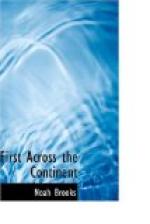We determined to take the canoes first over the portage, in hopes that by the afternoon the rain would cease, and we might carry our baggage across without injury. This was immediately begun by almost the whole party, who in the course of the day dragged four of the canoes to the head of the rapids, with great difficulty and labor. A guard, consisting of one sick man and three who had been lamed by accidents, remained with Captain Lewis (and a cook) to guard the baggage. This precaution was absolutely necessary to protect it from the Wahclellahs, whom we discovered to be great thieves, notwithstanding their apparent honesty in restoring our boat; indeed, so arrogant and intrusive have they become that nothing but our numbers, we are convinced, saves us from attack. They crowded about us while we were taking up the boats, and one of them had the insolence to throw stones down the bank at two of our men.
“We now found it necessary to depart from our mild and pacific course of conduct. On returning to the head of the portage, many of them met our men and seemed very ill-disposed. Shields had stopped to purchase a dog, and being separated from the rest of the party, two Indians pushed him out of the road, and attempted to take the dog from him. He had no weapon but a long knife, with which he immediately attacked them both, hoping to put them to death before they had time to draw their arrows; but as soon as they saw his design they fled into the woods. Soon afterward we were told by an Indian who spoke Clatsop, which we had ourselves learned during the winter, that the Wahclellahs had carried off Captain Lewis’ dog to their village below. Three men well armed were instantly despatched in pursuit of them, with orders to fire if there was the slightest resistance or hesitation. At the distance of two miles they came within sight of the thieves, who, finding themselves pursued, left the dog and made off. We now ordered all the Indians out of our camp, and explained to them that whoever stole any of our baggage, or insulted our men, should be instantly shot; a resolution which we were determined to enforce, as it was now our only means of safety.
“We were visited during the day by a chief of the Clahclellahs, who seemed mortified at the behavior of the Indians, and told us that the persons at the head of their outrages were two very bad men who belonged to the Wahclellah tribe, but that the nation did not by any means wish to displease us. This chief seemed very well-disposed, and we had every reason to believe was much respected by the neighboring Indians. We therefore gave him a small medal and showed him all the attention in our power, with which he appeared very much gratified.”




